Table of Contents
Introduction
According to Smart Airports Statistics, Smart airports represent a notable progression in the aviation sector, integrating modern technologies to enhance operational efficiency, passenger experiences, and safety. They optimize procedures such as passenger check-in, luggage management, and security checks, resulting in shorter wait times and improved traveler contentment.
Utilizing advanced surveillance and communication systems ensures safety and delivers up-to-the-minute information. Additionally, smart airports support environmental sustainability by embracing eco-friendly technologies. The smart airport market is witnessing growth due to the advantages it delivers and regulatory encouragement, indicating a promising evolution within the aviation industry.
Editor’s Choice
- The revenue of the Smart Airport market is projected to experience steady growth over the coming years at a CAGR of 8.8%.
- In 2022, the market generated USD 15.9 billion, and this figure is anticipated to increase to USD 36.2 billion in 2032.
- In terms of location breakdown, the Airside segment commands the largest share at 44.3%, emphasizing its significant role in the smart airport ecosystem.
- Amadeus IT Group SA secures a substantial 15% share, indicating its prominence in the industry.
- The global Smart Airport market exhibits a varied regional distribution, with North America emerging as the dominant player, commanding a significant share of 35.9%.
- Notably, in 2021, approximately 52% of airports introduced self-service bag drop facilities, which have the potential to reduce queues and lessen the reliance on airport personnel.
- During 2020, a significant majority of respondents worldwide, specifically 83%, indicated that the implementation of thermal scanners at boarding gates and during the boarding process would greatly boost their confidence.
Global Smart Airport Market Overview
Global Smart Airport Market Size
- The revenue of the Smart Airport market is projected to experience steady growth over the coming years at a CAGR of 8.8%.
- In 2022, the market generated USD 15.9 billion, and this figure is anticipated to increase to USD 17.3 billion in 2023.
- By 2030, the market is forecasted to surpass the USD 30 billion mark, specifically reaching USD 30.2 billion.
- Beyond that, the growth is expected to continue, with the market’s revenue estimated to reach USD 32.9 billion in 2031 and USD 36.2 billion in 2032.
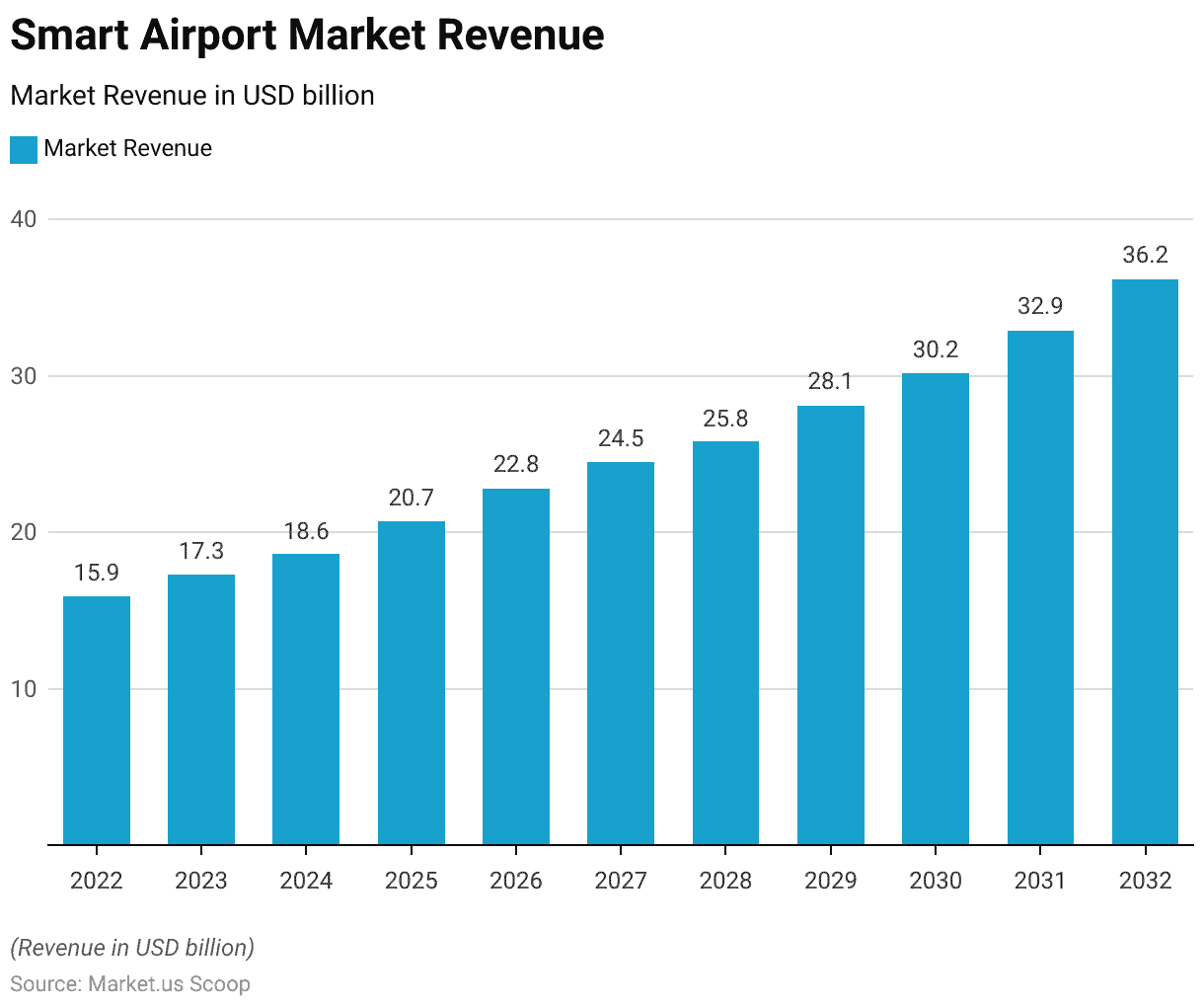
Smart Airport Market Size – By Technology Type
- The global Smart Airport market is characterized by its diversified technology segments, each contributing to the overall revenue.
- In 2022, the market recorded a total revenue of USD 15.9 billion, with the primary technology sectors being Passenger-Cargo Baggage Control at USD 6 billion, Communication Systems at USD 5 billion, Security Systems at USD 2 billion, Air/Ground Traffic Control at USD 2 billion, and Other Types at USD 2 billion.
- As we progress into the future, the market is set to expand consistently. By 2032, the total market revenue is expected to reach USD 36.2 billion.
- Notably, Passenger-Cargo Baggage Control is projected to grow to USD 13 billion, Communication Systems to USD 10 billion, Security Systems to USD 5 billion, Air/Ground Traffic Control to USD 4 billion, and Other Types to USD 4 billion.
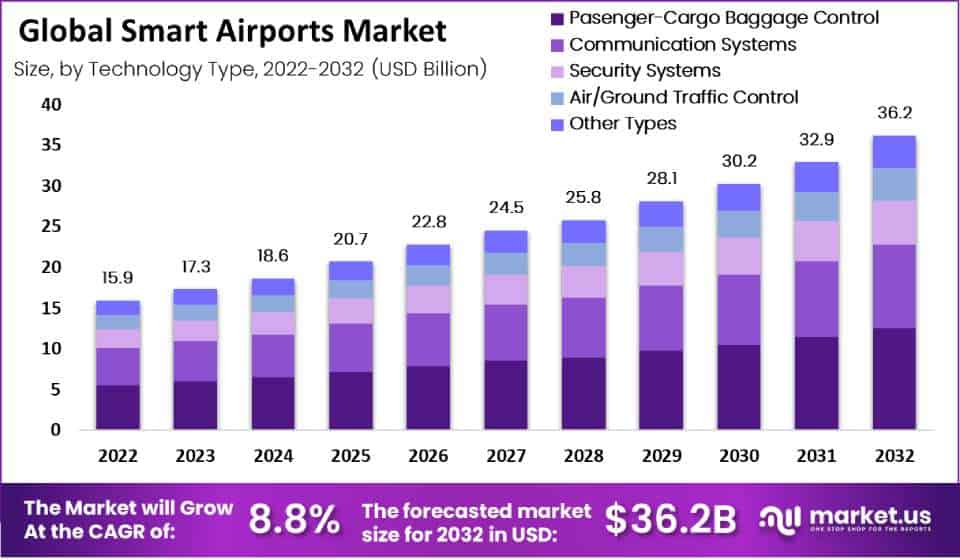
Global Smart Airport Market Share – By Location
- The global Smart Airport market is divided into various key locations, each holding a distinct market share percentage.
- In this breakdown, the Airside segment commands the largest share at 44.3%, emphasizing its significant role in the smart airport ecosystem.
- The Landside sector holds a substantial market share as well, accounting for 20.0%, while the Terminal Side segment accounts for 35.7% of the market share.
- This distribution highlights the critical areas within smart airports where technological advancements and innovations are implemented.
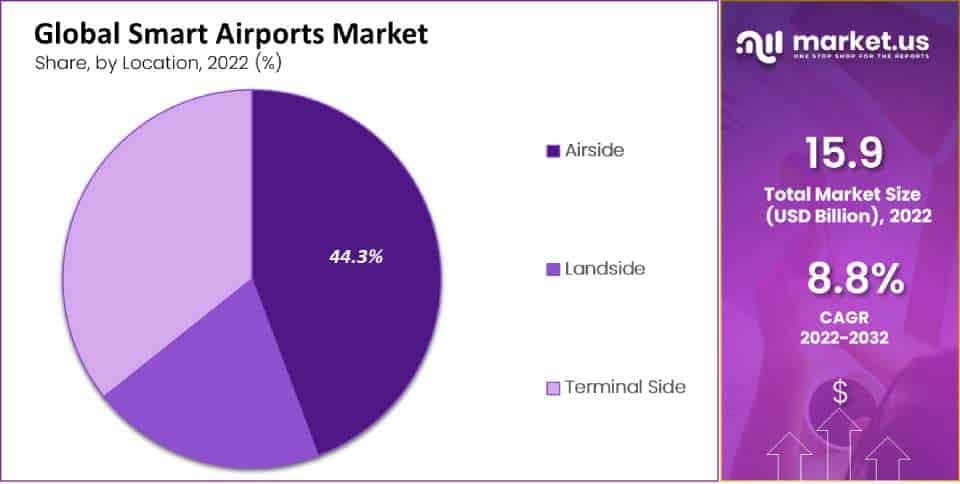
Key Players in the Smart Airport Market
- Within the Smart Airport market, several key players play significant roles, each contributing to the overall landscape with their respective market shares.
- Amadeus IT Group SA secures a substantial 15% share, indicating its prominence in the industry.
- Following closely behind, CISCO Systems Inc. commands a notable 10% market share.
- Collins Aerospace and Daifuku Co. Ltd. both hold substantial positions, with 9% and 11% market shares, respectively.
- Ascent Technologies and Honeywell International Inc. each contribute 10% and 9% to the market. Huawei Technologies Co. Ltd. and IBM Corporation are also important players, holding 8% and 9% shares, respectively.
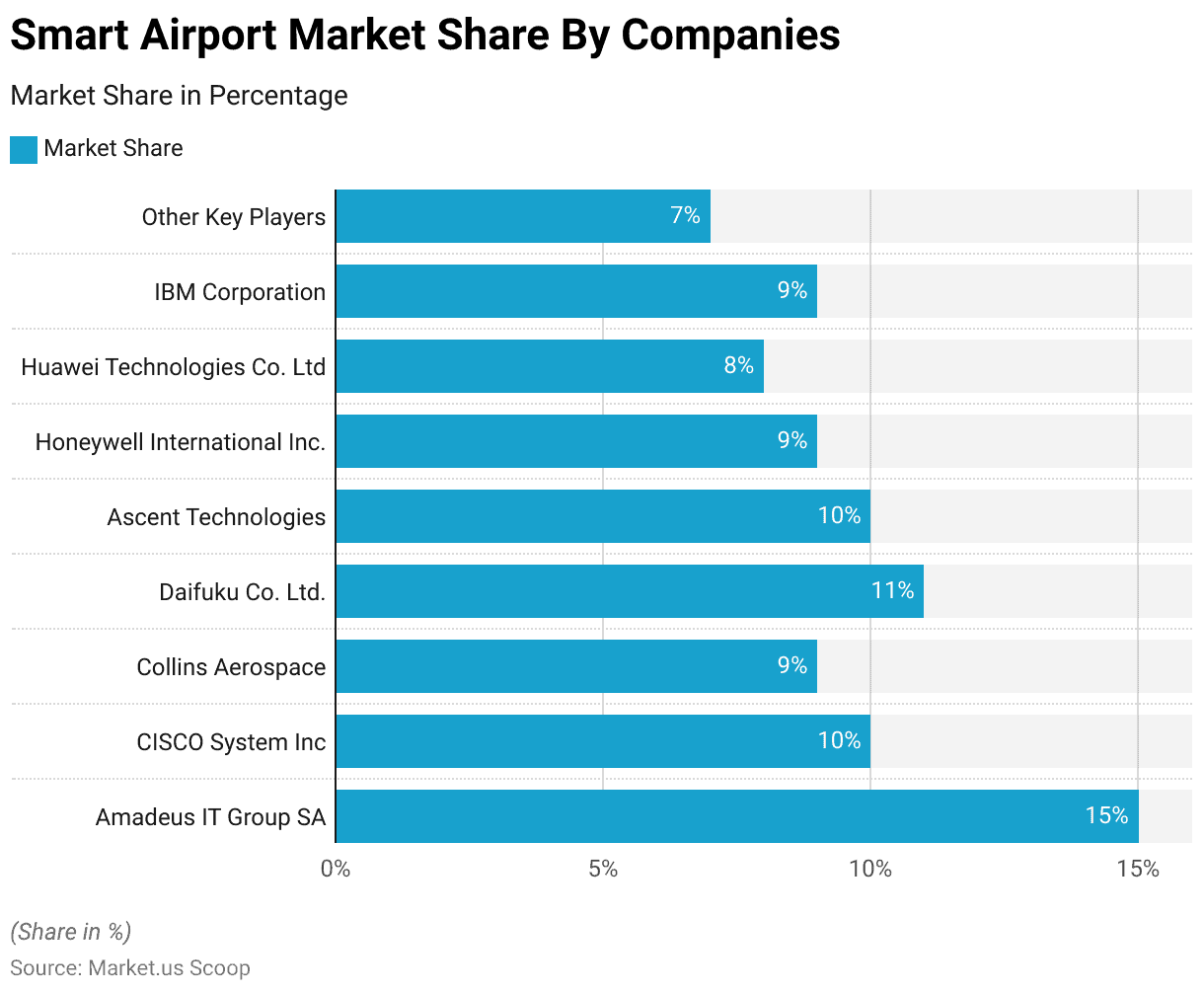
Regional Analysis of the Smart Airport Market
- The global Smart Airport market exhibits a varied regional distribution, with North America emerging as the dominant player, commanding a significant share of 35.9%.
- Europe follows closely behind, contributing 21.0% to the market, showcasing its substantial presence. The Asia-Pacific (APAC) region plays a pivotal role as well, holding a substantial share of 23.7%.
- In Latin America, the Smart Airport market accounts for 14.2% of the overall distribution, while the Middle East and Africa (MEA) region represents 5.2%.
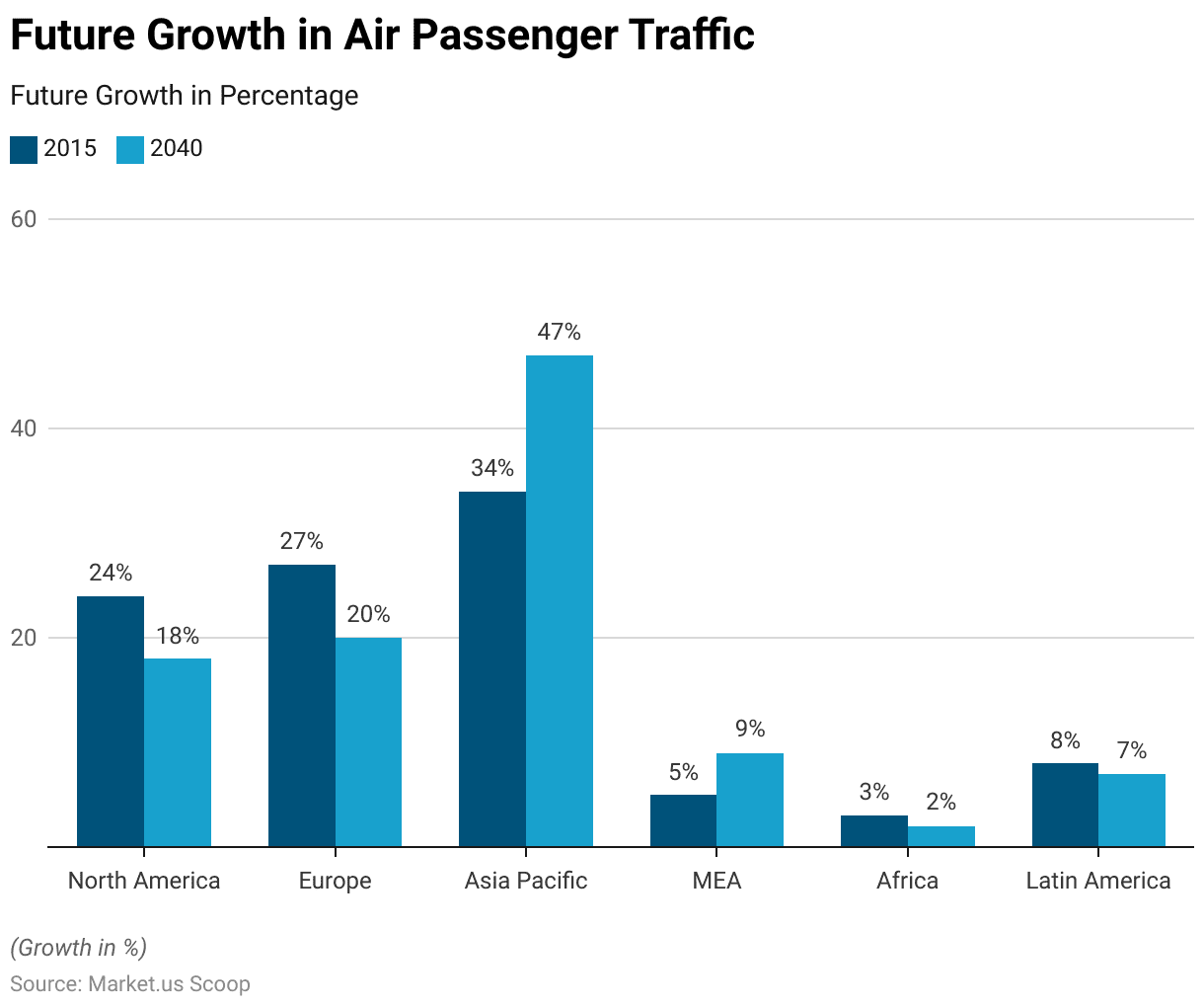
Airport Passenger Processing Statistics
- In 2021, the worldwide airline industry faced a significant challenge due to the COVID-19 pandemic, resulting in just over 2.2 billion passengers flying.
- This marked a 50% drop in global air travel compared to 2019.
- Over the past decade, except for one year, there has been a consistent increase in the number of scheduled passengers handled by the global airline sector.
- Scheduled passengers refer to those who have booked flights with commercial airlines, excluding charter flights for private groups.
- Notably, in 2019, the Asia Pacific region led in terms of airline passenger traffic, accounting for a third of the global total and hosting some of the busiest air routes.
Future Growth in Air Passenger Traffic
- In terms of future growth in air passenger traffic, there are notable shifts expected by 2040 compared to 2015.
- In North America, the percentage is projected to decrease from 24% in 2015 to 18% in 2040. Similarly, Europe is expected to see a decline from 27% to 20%.
- On the other hand, the Asia Pacific region is poised for substantial growth, with its share projected to rise significantly from 34% in 2015 to 47% in 2040.
- The Middle East and Africa (MEA) are also expected to experience growth, increasing from 5% in 2015 to 9% in 2040.
- Conversely, Africa’s share is projected to decrease slightly from 3% to 2%.
- Latin America is expected to maintain a relatively stable share, with a slight decrease from 8% in 2015 to 7% in 2040.
Adoption of Technologies in Smart Airports
Technology Adoption During the COVID-19 Pandemic
- Amid the substantial financial losses faced by airlines and airports worldwide due to the COVID-19 pandemic, digitalization has emerged as a crucial solution.
- This approach has proven effective in mitigating the pandemic’s impact while sustaining the demand for air travel. In the “new normal” era, social distancing measures have become imperative, driving the need for operational enhancements.
- Various technologies, including Business Intelligence and Artificial Intelligence, can be harnessed to efficiently manage terminal flow and implement social distancing measures.
- Additionally, the trend toward online booking and check-in is gaining momentum and is expected to continue growing.
Smart Touchpoint Installed Base at Airports
- The installation base of smart touchpoints at airports has seen a steady increase in recent years.
- In 2019, there were 46,658 smart touchpoint installations, which grew to 50,531 in 2020.
- Looking ahead to 2025, it is projected to significantly expand to 72,285 installations.
- This upward trend reflects the aviation industry’s commitment to enhancing passenger experiences and operational efficiency through the deployment of smart technology.
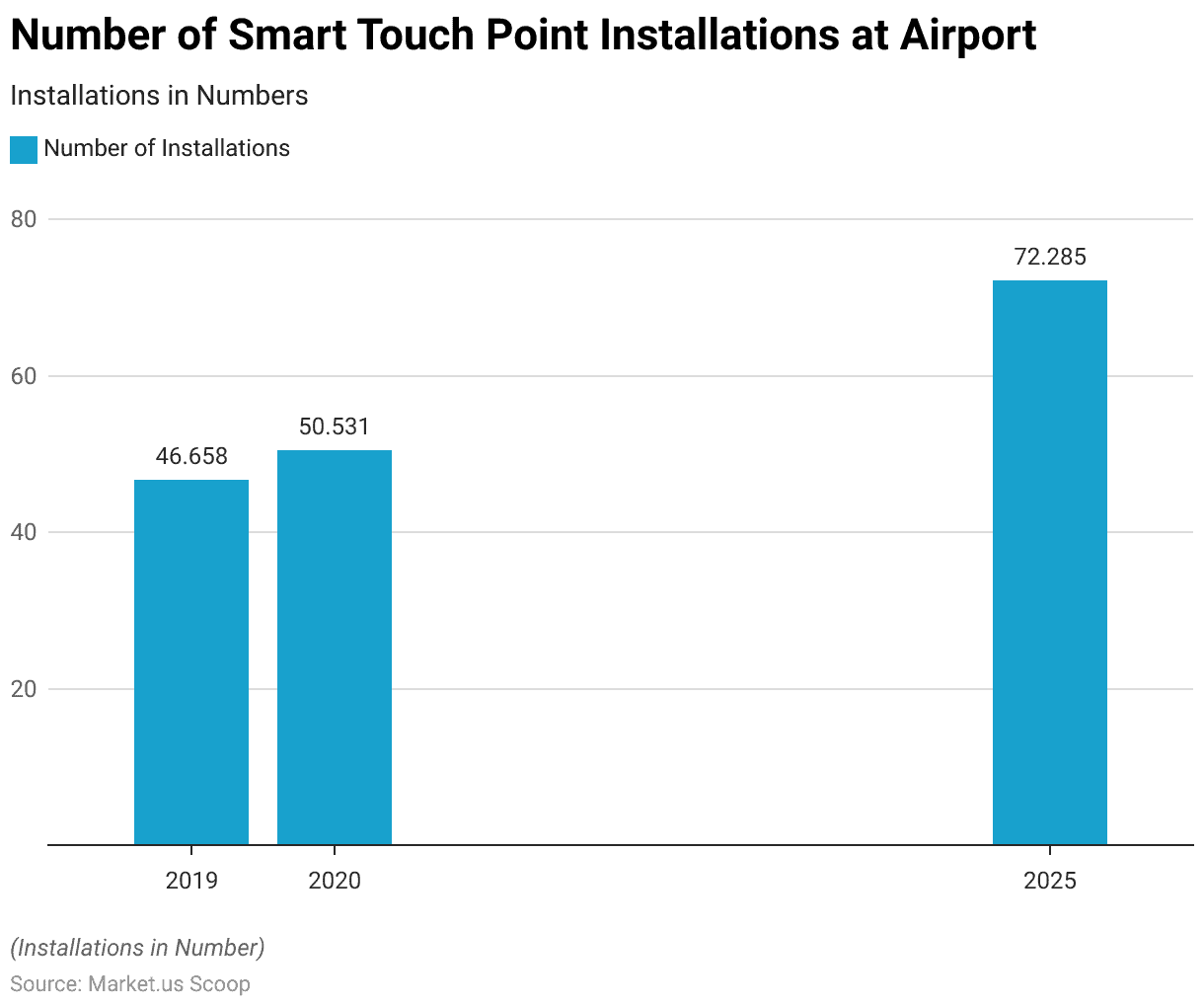
Passenger Preferences and Priorities in Smart Airports
- During 2020, a significant majority of respondents worldwide, specifically 83%, indicated that the implementation of thermal scanners at boarding gates and during the boarding process would greatly boost their confidence.
- Furthermore, 85% of the surveyed individuals expressed the belief that implementing staggered boarding procedures would play a crucial role in increasing their confidence when approaching the boarding gate and during the boarding phase.
- In a survey conducted in 2020, approximately 88% of air travelers who participated expressed that they would feel more confident about flying in the post-COVID-19 era if airlines were to rearrange seating by leaving empty seats as a precautionary measure for social distancing.
- In the 2021 survey, a significant 94% of those surveyed emphasized that investing in cybersecurity measures was a top priority for airports.
Discuss your needs with our analyst
Please share your requirements with more details so our analyst can check if they can solve your problem(s)



